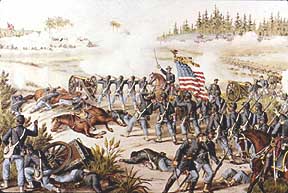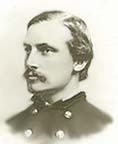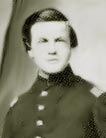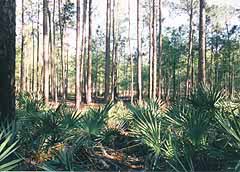
The
Battle of Olustee (Ocean Pond)
 Seven
months after their gallant charge on Fort Wagner, the
54th Massachusetts Colored Infantry was engaged in the
Battle of Olustee (Ocean Pond) under their new commander
Colonel Edward Needles Hallowell. This event, which began
as a skirmish on February 20, 1864, escalated into a
full-scale battle in the pine woods by Olustee Station,
near the swamplands in north-central Florida. Though the
Union forces of Brigadier General Truman Seymour and the
Confederate troops of Brigadier General Joseph Finegan
were evenly matched—with approximately 5000 soldiers
from each side swept up in combat—the four-hour
battle ended in a bitter defeat for the Federals. The
Union lost more than 1800 soldiers killed, wounded,
missing or captured—among the highest percentage of
casualties in the war—a far greater loss in
comparison to the Confederacy's casualties of fewer than
950 soldiers. Seven
months after their gallant charge on Fort Wagner, the
54th Massachusetts Colored Infantry was engaged in the
Battle of Olustee (Ocean Pond) under their new commander
Colonel Edward Needles Hallowell. This event, which began
as a skirmish on February 20, 1864, escalated into a
full-scale battle in the pine woods by Olustee Station,
near the swamplands in north-central Florida. Though the
Union forces of Brigadier General Truman Seymour and the
Confederate troops of Brigadier General Joseph Finegan
were evenly matched—with approximately 5000 soldiers
from each side swept up in combat—the four-hour
battle ended in a bitter defeat for the Federals. The
Union lost more than 1800 soldiers killed, wounded,
missing or captured—among the highest percentage of
casualties in the war—a far greater loss in
comparison to the Confederacy's casualties of fewer than
950 soldiers.
 The 54th Massachusetts was not the
only black regiment (under the command of white officers)
engaged in combat at Olustee. Colonel Charles W.
Fribley's 8th United States Colored Troops was thrust
into the battle at the outset, and Lieutenant Colonel
W.N. Reed's 35th United States Colored Troops of North
Carolina fought alongside the 54th—both regiments
having entered the fray near the end of the battle.
Though the losses of the 35th U.S.C.T. and the 54th were
not severe, it was the 8th U.S.C.T. that suffered the
most with 310 casualties—the heaviest regimental
loss in the entire battle. This was the 8th's baptism of
fire, and as they lacked training and experience on the
mindset and maneuvers of rigorous combat, they were
slaughtered. The 54th Massachusetts was not the
only black regiment (under the command of white officers)
engaged in combat at Olustee. Colonel Charles W.
Fribley's 8th United States Colored Troops was thrust
into the battle at the outset, and Lieutenant Colonel
W.N. Reed's 35th United States Colored Troops of North
Carolina fought alongside the 54th—both regiments
having entered the fray near the end of the battle.
Though the losses of the 35th U.S.C.T. and the 54th were
not severe, it was the 8th U.S.C.T. that suffered the
most with 310 casualties—the heaviest regimental
loss in the entire battle. This was the 8th's baptism of
fire, and as they lacked training and experience on the
mindset and maneuvers of rigorous combat, they were
slaughtered.
As a result of the Battle of Olustee, the Federals
retreated to Jacksonville. This battle of the Florida
Campaign would be the largest battle of the Civil War
fought in the state.
Above left:
Soldiers of the 54th Massachusetts fight in the Battle of
Olustee. Photo of painting courtesy of Florida
Photographic Collection. Above right: Major Edward
Needles Hallowell of the 54th Massachusetts, before his
colonelcy with the regiment, image care of
MOLLUS—Mass. Collection, USAMHI.
Special
thanks to Brian Pohanka for his contributions to this
article.

The
following is an excerpt from a letter dated March 20,
1864 to the editor of the Christian Recorder. This
letter by Sergeant Major Rufus S. Jones, a senior
non-commissioned officer (NCO) of the 8th U.S. Colored
Troops (of African descent), tells his story of the
battle:
Our force was five thousand troops, composed of
artillery, cavalry, and infantry. The Eighth and Seventh
Connecticut and Seventh New Hampshire Volunteers are
brigaded together. No interruption was had during the day
till 3 o'clock P.M. Musket firing was heard in front, the
Federals having driven in the Rebel pickets. Heavy firing
was soon heard, and the troops were moved forward
rapidly. The Eighth U.S.C.T., having been on the railroad
for a short distance, was ordered to change direction to
the right, and received orders to go into the fight
without unslinging knapsacks, or the sergeants taking off
their sashes, which caused nearly all the first sergeants
to be killed or wounded. Only one-half the regiment was
loaded, so harmless had been the estimate placed upon the
enemy, that he was not looked for short of Lake City, and
not there, if any place was left open for retreat. The
Battle of Olustee, or Ocean Pond, on the 20th of
February, will be long remembered by the Eighth, which
suffered terribly in the conflict. No expectation of
meeting the enemy is apparent, when not sufficient
ammunition was brought along to fire over sixty rounds of
musketry. Colonel Charles Fribley, of the Eighth, fell,
mortally wounded, a short time after going into the
engagement. Major Loren Burritt then took command, and
fell, badly wounded, and was borne to the rear. Both
field officers now being taken from the regiment, Captain
R.C. Bailey, of Company B, being the Senior Captain, took
command of the regiment, and knowing that the ammunition
was exhausted, ordered the regiment to the rear of the
Fifty-Fourth Massachusetts, which was now engaging the
enemy successfully, and, had one more regiment come to
its assistance the occupation of Jacksonville by so large
a force as is now here would be useless. The battle
lasted from three o'clock P.M. until dark, when a retreat
was ordered by the Commanding General. The wounded, both
white and colored, were placed in ambulances and wagons
of all kinds, and hurried to (the towns of) Baldwin or to
Barber. I cannot but speak of the conduct of Dr. Alex P.
Heichold, Surgeon of the Eighth, who was particular in
collecting the colored troops who were wounded, and
placed them in his ambulance and pushed on for a place of
safety. Some one thought the white troops should be
brought away also; but Dr. H. said: "I know what
will become of the white troops who fall into the enemy's
possession, but I am not certain as to the fate of the
colored troops," and pushed with alacrity towards
Baldwin. He also dressed the wounds of all the Eighth
that came into camp at Barber, and a great many others
belonging to white regiments. It looked sad to see men
wounded coming into camp with their arms and equipments
on, so great was their endurance and so determined were
they to defend themselves till the death.
Edwin S.
Redkey, A Grand Army of Black Men: Letters from
African-American Soldiers in the Union Army, 1861-1865
(New York: Cambridge University Press, 1992), pp. 41-42.

 After their slaughter at Olustee,
the 8th U.S. Colored Troops remained for a time in
Jacksonville. First Lieutenant Oliver Willcox Norton of
Company K wrote a letter to his father describing the
surrounding area, giving his comments on the events of
the battle as well. The following are passages from his
letter dated March 1, 1864: After their slaughter at Olustee,
the 8th U.S. Colored Troops remained for a time in
Jacksonville. First Lieutenant Oliver Willcox Norton of
Company K wrote a letter to his father describing the
surrounding area, giving his comments on the events of
the battle as well. The following are passages from his
letter dated March 1, 1864:
On the 20th we fought our first battle at Olustee, or
Ocean Pond, as some call it. They might as well call any
other place in these pine woods some high sounding name,
for this country is all alike. Since leaving Jacksonville
I have not seen five hundred acres of cleared land in a
journey of forty-five miles to the west. The country is
covered with scattered pines, most of them blazed for
turpentine. The ground between the trees is covered with
a dense growth of coarse grass and palmetto shrubs. At
intervals there are swamps, not deep, but broad and
wet....
 I shall give you more
particularly my own ideas of the performance of our own
men. I want to be true and I cannot endorse all that has
been said of them. First, I think no battle was ever more
wretchedly fought. I was going to say planned, but there
was no plan. No new regiment ever went into their first
fight in more unfavorable circumstances. Second, no
braver men ever faced an enemy. To have made these men
fight well, I would have halted them out of range of the
firing, formed my line, unslung knapsacks, got my
cartridge boxes ready, and loaded. Then I would have
moved it up to the support of a regiment already engaged.
I would have had them lie down and let the balls and
shells whistle over them till they got a little used to
it. Then I would have moved them to the front, told them
to get as close to the ground as they could and go in.... I shall give you more
particularly my own ideas of the performance of our own
men. I want to be true and I cannot endorse all that has
been said of them. First, I think no battle was ever more
wretchedly fought. I was going to say planned, but there
was no plan. No new regiment ever went into their first
fight in more unfavorable circumstances. Second, no
braver men ever faced an enemy. To have made these men
fight well, I would have halted them out of range of the
firing, formed my line, unslung knapsacks, got my
cartridge boxes ready, and loaded. Then I would have
moved it up to the support of a regiment already engaged.
I would have had them lie down and let the balls and
shells whistle over them till they got a little used to
it. Then I would have moved them to the front, told them
to get as close to the ground as they could and go in....
Our regiment has been drilled too much for dress parade
and too little for the field. They can march well, but
they cannot shoot rapidly or with effect. Some of them
can, but the greater part cannot. Colonel Fribley had
applied time and again for permission to practice his
regiment in target firing, and been always refused. When
we were flanked, flesh and blood could stand it no
longer, and Colonel Fribley, without orders, gave the
command to fall back slowly, firing as we went. He fell,
shot through the heart, very soon after that. Where was
our general and where was his force? Coming up in the
rear, and as they arrived, they were put in, one regiment
at a time, and whipped by detail....
You may judge of the severity of the fight by this: Of
fifty-five men in Company K who went into the fight but
two came out untouched by balls. Of twenty-two officers
engaged but two were untouched. I got a ball in my hat
that made five holes and drew blood on my head. Another
took off the corner of my haversack.
Colonel Fribley was shot through the heart, Major
Burritt, gallant fellow, had both legs broken. Captain
Wagner fell pierced with three balls, but got off, and I
hear is in a fair way to recovery....
Oliver
Willcox Norton, Army Letters, 1861-1865 (Ohio:
Press at Morningside, 1990), pp. 201-203.
Above
left: Oliver Willcox Norton in December 1863, after his
promotion to First Lieutenant of the 8th USCT,
Philadelphia, Pennsylvania. Image care of Norton's Army Letters book. Above right: Olustee
Battlefield State Historic Site, with its pine woods and
palmetto shrubs (photo by CNO). The battlefield was
acquired by the state of Florida in 1909.

Index to Shaw's Pages
Back | Home
Copyright © 2001 - 2009 1st Dragoon's Civil War Site. All rights reserved.
Spider
Map Index
|

 Seven
months after their gallant charge on Fort Wagner, the
54th Massachusetts Colored Infantry was engaged in the
Battle of Olustee (Ocean Pond) under their new commander
Colonel Edward Needles Hallowell. This event, which began
as a skirmish on February 20, 1864, escalated into a
full-scale battle in the pine woods by Olustee Station,
near the swamplands in north-central Florida. Though the
Union forces of Brigadier General Truman Seymour and the
Confederate troops of Brigadier General Joseph Finegan
were evenly matched—with approximately 5000 soldiers
from each side swept up in combat—the four-hour
battle ended in a bitter defeat for the Federals. The
Union lost more than 1800 soldiers killed, wounded,
missing or captured—among the highest percentage of
casualties in the war—a far greater loss in
comparison to the Confederacy's casualties of fewer than
950 soldiers.
Seven
months after their gallant charge on Fort Wagner, the
54th Massachusetts Colored Infantry was engaged in the
Battle of Olustee (Ocean Pond) under their new commander
Colonel Edward Needles Hallowell. This event, which began
as a skirmish on February 20, 1864, escalated into a
full-scale battle in the pine woods by Olustee Station,
near the swamplands in north-central Florida. Though the
Union forces of Brigadier General Truman Seymour and the
Confederate troops of Brigadier General Joseph Finegan
were evenly matched—with approximately 5000 soldiers
from each side swept up in combat—the four-hour
battle ended in a bitter defeat for the Federals. The
Union lost more than 1800 soldiers killed, wounded,
missing or captured—among the highest percentage of
casualties in the war—a far greater loss in
comparison to the Confederacy's casualties of fewer than
950 soldiers. The 54th Massachusetts was not the
only black regiment (under the command of white officers)
engaged in combat at Olustee. Colonel Charles W.
Fribley's 8th United States Colored Troops was thrust
into the battle at the outset, and Lieutenant Colonel
W.N. Reed's 35th United States Colored Troops of North
Carolina fought alongside the 54th—both regiments
having entered the fray near the end of the battle.
Though the losses of the 35th U.S.C.T. and the 54th were
not severe, it was the 8th U.S.C.T. that suffered the
most with 310 casualties—the heaviest regimental
loss in the entire battle. This was the 8th's baptism of
fire, and as they lacked training and experience on the
mindset and maneuvers of rigorous combat, they were
slaughtered.
The 54th Massachusetts was not the
only black regiment (under the command of white officers)
engaged in combat at Olustee. Colonel Charles W.
Fribley's 8th United States Colored Troops was thrust
into the battle at the outset, and Lieutenant Colonel
W.N. Reed's 35th United States Colored Troops of North
Carolina fought alongside the 54th—both regiments
having entered the fray near the end of the battle.
Though the losses of the 35th U.S.C.T. and the 54th were
not severe, it was the 8th U.S.C.T. that suffered the
most with 310 casualties—the heaviest regimental
loss in the entire battle. This was the 8th's baptism of
fire, and as they lacked training and experience on the
mindset and maneuvers of rigorous combat, they were
slaughtered. After their slaughter at Olustee,
the 8th U.S. Colored Troops remained for a time in
Jacksonville. First Lieutenant Oliver Willcox Norton of
Company K wrote a letter to his father describing the
surrounding area, giving his comments on the events of
the battle as well. The following are passages from his
letter dated March 1, 1864:
After their slaughter at Olustee,
the 8th U.S. Colored Troops remained for a time in
Jacksonville. First Lieutenant Oliver Willcox Norton of
Company K wrote a letter to his father describing the
surrounding area, giving his comments on the events of
the battle as well. The following are passages from his
letter dated March 1, 1864: I shall give you more
particularly my own ideas of the performance of our own
men. I want to be true and I cannot endorse all that has
been said of them. First, I think no battle was ever more
wretchedly fought. I was going to say planned, but there
was no plan. No new regiment ever went into their first
fight in more unfavorable circumstances. Second, no
braver men ever faced an enemy. To have made these men
fight well, I would have halted them out of range of the
firing, formed my line, unslung knapsacks, got my
cartridge boxes ready, and loaded. Then I would have
moved it up to the support of a regiment already engaged.
I would have had them lie down and let the balls and
shells whistle over them till they got a little used to
it. Then I would have moved them to the front, told them
to get as close to the ground as they could and go in....
I shall give you more
particularly my own ideas of the performance of our own
men. I want to be true and I cannot endorse all that has
been said of them. First, I think no battle was ever more
wretchedly fought. I was going to say planned, but there
was no plan. No new regiment ever went into their first
fight in more unfavorable circumstances. Second, no
braver men ever faced an enemy. To have made these men
fight well, I would have halted them out of range of the
firing, formed my line, unslung knapsacks, got my
cartridge boxes ready, and loaded. Then I would have
moved it up to the support of a regiment already engaged.
I would have had them lie down and let the balls and
shells whistle over them till they got a little used to
it. Then I would have moved them to the front, told them
to get as close to the ground as they could and go in....